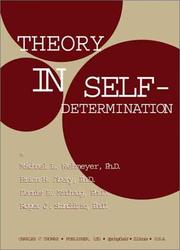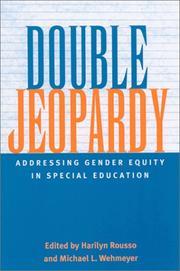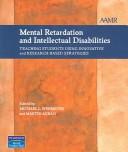| Listing 1 - 10 of 26 | << page >> |
Sort by
|
Book
ISBN: 9780195398786 9780199984398 Year: 2013 Publisher: New York Oxford University Press
Abstract | Keywords | Export | Availability | Bookmark
 Loading...
Loading...Choose an application
- Reference Manager
- EndNote
- RefWorks (Direct export to RefWorks)
The Oxford Handbook of Positive Psychology and Disability is the first comprehensive text providing a foundation for research and practice focusing on positive attributes of disability. The handbook’s introductory chapters introduce a paradigmatic change in how disability itself is understood, leading to the opportunity to focus research and practice regarding positive psychology’s emphasis on optimal human functioning to understand and support people with disabilities. The text provides chapters synthesizing research in traditional areas of positive psychology, including quality of life, satisfaction and well-being, hope, optimism, resilience, coping, and self-determination. Next, chapters addressing systemic applications in positive psychology to disability provide information on issues pertaining to career development and career thoughts, positive behavior supports, supported employment, education, family systems, and during aging. In addition, the text provides chapters addressing the knowledge base pertaining to the positive psychology of specific types of disability, including cognitive and developmental disabilities, physical disabilities, emotional and behavioral disabilities, and autism spectrum disorders. The text provides a foundation for infusing positive psychology into disability research and practice, and disability issues into positive psychology.
Positive psychology --- People with disabilities --- -Cripples --- Disabled --- Disabled people --- Disabled persons --- Handicapped --- Handicapped people --- Individuals with disabilities --- People with physical disabilities --- Persons with disabilities --- Physically challenged people --- Physically disabled people --- Physically handicapped --- Persons --- Disabilities --- Sociology of disability --- Psychology --- E-books --- -Psychology
Book
ISBN: 9781557669872 Year: 2013
Abstract | Keywords | Export | Availability | Bookmark
 Loading...
Loading...Choose an application
- Reference Manager
- EndNote
- RefWorks (Direct export to RefWorks)

ISBN: 0398083584 9780398083588 0398073694 9780398073695 0398073708 9780398073701 Year: 2003 Publisher: Springfield, Ill. C.C. Thomas
Abstract | Keywords | Export | Availability | Bookmark
 Loading...
Loading...Choose an application
- Reference Manager
- EndNote
- RefWorks (Direct export to RefWorks)
This text provides a comprehensive overview of three theoretical perspectives proposed during the past decade addressing the self-determination construct as it applies to the field of special education. The three models were selected primarily because they have focused on defining and categorizing self-determination for all students with disabilities, including students with mental retardation and other cognitive disabilities. These models are intended to provide students and practitioners a solid grounding in self-determination theory. All models have been evaluated among students with cognit

ISBN: 0791450767 Year: 2001 Publisher: Albany State University of New York Press
Abstract | Keywords | Export | Availability | Bookmark
 Loading...
Loading...Choose an application
- Reference Manager
- EndNote
- RefWorks (Direct export to RefWorks)
Meisjes met een handicap, zijn ze dubbel benadeeld in het onderwijs? Meer en meer bewijsmateriaal hierover wijst in de richting dat gehandicapt-zijn en vrouw-zijn voor deze meisjes een grotere kans betekent om in armoede en werkloosheid te verzeilen bij het verlaten van de school. Ondanks het dubbele risico dat meisjes met een handicap lopen, is er hierover nog onvoldoende onderzoek gedaan. Dit boek wil een aanzet zijn tot een grondig debat over dit thema. Vrouwen met een handicap worden maar al te vaak beschouwd als afhankelijk, ziek,aseksueel en incompetent. Die stereotyperingen focussen op wat ze niet kunnen en laten hun talenten en bekwaamheden buiten beschouwing. Moet het onderwijs niet zorgen dat elk individu het best mogelijk onderwijs krijgt, dat iedereen gelijke kansen heeft?
Sociology of minorities --- Sociology of the family. Sociology of sexuality --- Social policy --- Teaching --- Disability --- Equal opportunities --- Gender --- Education --- Book --- United States of America
Book
ISBN: 1416628959 1416628967 9781416628958 9781416628965 9781416628934 Year: 2020 Publisher: Alexandria, Virginia : ASCD,
Abstract | Keywords | Export | Availability | Bookmark
 Loading...
Loading...Choose an application
- Reference Manager
- EndNote
- RefWorks (Direct export to RefWorks)
"This book promotes self-determined learning and lays out a path that leads to a new direction and returns the student to the educational picture"--
Motivation in education. --- Student-centered learning. --- Mastery learning. --- Learning, Psychology of. --- Self-culture.

ISBN: 0536930228 0131701576 Year: 2005 Publisher: Washington American association on intellectual and developmental disabilities
Abstract | Keywords | Export | Availability | Bookmark
 Loading...
Loading...Choose an application
- Reference Manager
- EndNote
- RefWorks (Direct export to RefWorks)
Book
ISBN: 9780190227500 0190227508 Year: 2014 Publisher: New York : 0xford University Press,
Abstract | Keywords | Export | Availability | Bookmark
 Loading...
Loading...Choose an application
- Reference Manager
- EndNote
- RefWorks (Direct export to RefWorks)
Positive psychology --- People with disabilities --- Psychology --- People with disabilities - Psychology
Book
ISBN: 3030645371 3030645363 Year: 2021 Publisher: Cham : Springer International Publishing AG,
Abstract | Keywords | Export | Availability | Bookmark
 Loading...
Loading...Choose an application
- Reference Manager
- EndNote
- RefWorks (Direct export to RefWorks)
This open access handbook provides a comprehensive overview of the growing field of positive education, featuring a broad range of theoretical, applied, and practice-focused chapters from leading international experts. It demonstrates how positive education offers an approach to understanding learning that blends academic study with life skills such as self-awareness, emotion regulation, healthy mindsets, mindfulness, and positive habits, grounded in the science of wellbeing, to promote character development, optimal functioning, engagement in learning, and resilience. The handbook offers an in-depth understanding and critical consideration of the relevance of positive psychology to education, which encompasses its theoretical foundations, the empirical findings, and the existing educational applications and interventions. The contributors situate wellbeing science within the broader framework of education, considering its implications for teacher training, education and developmental psychology, school administration, policy making, pedagogy and curriculum studies. This landmark collection will appeal to researchers and practitioners working in positive psychology, educational and school psychology, developmental psychology, education, counselling, social work and public policy.
Psicologia positiva --- Educació --- Escolarització --- Civilització --- Art en l'educació --- Associacions de pares d'alumnes --- Autoaprenentatge --- Autogestió pedagògica --- Autonomia de l'alumne --- Avaluació educativa --- Ciències de l'educació --- Competències bàsiques en educació --- Comunicació en l'educació --- Diferències entre sexes en l'educació --- Discriminació en l'educació --- Dones en l'educació --- Educació afectiva --- Educació ambiental --- Educació clàssica --- Educació cívica --- Educació comparada --- Educació comunista --- Educació d'adults --- Educació i lleure --- Educació en valors --- Educació familiar --- Educació integral --- Educació islàmica --- Educació militar --- Educació del consumidor --- Educació i desenvolupament econòmic --- Educació permanent --- Educació sanitària --- Educació STEM --- Educació tecnològica --- Educació viària --- Educadors --- Escola a casa --- Estadística educativa --- Estudiants --- Estudis a l'estranger --- Exàmens --- Experiències educatives --- Extensió universitària --- Fotografia en l'ensenyament --- Mètodes d'estudi --- Pedagogia --- Psicologia de l'aprenentatge --- Ràdio en l'ensenyament --- Relacions família-escola --- Sexisme en l'educació --- Sistema educatiu --- Sistemes de comunicacions mòbils en l'educació --- Socialització --- Sociologia de l'educació --- Teatre en l'ensenyament --- Teatre escolar --- Televisió en l'ensenyament --- Treball de grup en educació --- Universitats --- Vídeo en l'ensenyament --- Coeducació --- Col·laboració universitat-empresa --- Disciplina mental --- Ensenyament --- Erudició --- Escoles --- Formació --- Legislació educativa --- Psicologia --- Felicitat --- Resiliència (Tret de la personalitat) --- Associacions de mares i pares d'alumnes --- Positive Psychology --- Education, general --- Child and School Psychology --- Pedagogic Psychology --- Educational Philosophy --- Psychotherapy and Counseling --- Pedagogy --- School Psychology --- Educational Psychology --- Counseling Psychology --- Open Access --- Positive Education --- Resilience --- Social and Emotional Learning --- Mindfulness in education --- Positive Emotions --- Playfulness --- Emotional Development --- Character Strengths Interventions --- Trauma-informed Approaches --- Positive Youth Development --- Systems Informed Positive psychology --- Strength-based Reflective Practice --- Flourishing --- Creative Learning --- Positive Spirituality --- Whole Child Approach to Education --- Teacher and Staff Wellbeing --- Positive Organizational Scholarship --- Social Work and Community Development --- Education --- Child, developmental & lifespan psychology --- Philosophy & theory of education --- Psychotherapy --- Medical counselling --- Anàlisi de tasques en educació
Book
ISBN: 9798216131649 1440831149 1440831130 9781440831140 9781440831133 9781440847264 9781440847271 9781440847288 Year: 2017 Publisher: Santa Barbara, California : Praeger, an Imprint of ABC-CLIO, LLC,
Abstract | Keywords | Export | Availability | Bookmark
 Loading...
Loading...Choose an application
- Reference Manager
- EndNote
- RefWorks (Direct export to RefWorks)
This handbook presents a concise and clear overview of special education services in more than 70 countries across the world using the Article on Education in the United Nations Convention on the Rights of Persons with disabilities as the analytical frame.
Special education --- Children with disabilities --- Education
Book
ISBN: 9781793634658 1793634653 Year: 2022 Publisher: Lanham: Lexington Books,
Abstract | Keywords | Export | Availability | Bookmark
 Loading...
Loading...Choose an application
- Reference Manager
- EndNote
- RefWorks (Direct export to RefWorks)
"Personal factors are an element of social-ecological models of disability but have not been well defined or described. Understanding Disability examines personal factors from the field of positive psychology to begin to identify and build strengths-based approaches to promoting the full participation, dignity, and well-being of disabled people"--
| Listing 1 - 10 of 26 | << page >> |
Sort by
|

 Search
Search Feedback
Feedback About UniCat
About UniCat  Help
Help News
News